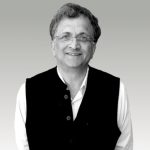Home › Nugget

3 - Key career choices - Ramachandra Guha on his book “Gandhi – The years that changed the world”
Dr. Guha speaks about some of the key choices he made at various forks in the road that presented themselves in front of him. He specifically talks about the crucial role of his father and his wife in giving him the flexibility to pursue his calling without getting him to “play safe” or to seek commercially lucrative options at the expense of pursuing things that energized him.
More from same Guest
Dr. Guha speaks about his journey from playing cricket for St. Stephens (along with players like Kirti Azad who played for India and was part of the 1983 World Cup winning Cricket team) to pursuing a PhD in IIM Kolkata to eventually becoming a historian. He talks about the context behind some of the choices along the way and talks about the role of chance at various inflection points.
Dr. Guha shares his perspectives around some of the elements behind being an effective historian. He talks about how his early years in cricket prepared him for the grind of being a historian and refers to the criticality of an independent mind and the ability to articulate complex thoughts in everyday language. He also gives us a glimpse into the rhythm of his typical day, especially in the mornings.
Dr. Guha speaks about some of the key choices he made at various forks in the road that presented themselves in front of him. He specifically talks about the crucial role of his father and his wife in giving him the flexibility to pursue his calling without getting him to “play safe” or to seek commercially lucrative options at the expense of pursuing things that energized him.
Dr. Guha speaks about how Gandhiji straddled multiple careers concurrently (including that of a Politician, Social Reformer, Prophet and Writer). He talks about the fact that he saw his life as one indivisible whole where he emphasized each facet at a different point in time.
Dr Guha speaks about the phase of transition when Gandhiji moved from South Africa to India. He talks about how Gandhiji was advised (by Gopal Krishna Gokhale) to spend about a year understanding the nuances of the country before embarking on a journey of change. He also speaks about Gandhiji’s open-mindedness and willingness to listen which enabled him to absorb the complexity of the country without bringing his biases.
Dr Guha discusses the dichotomy between Gandhiji’s accomplishments on the public front and contrasts that with some of the challenges he had with relationships on the home front. He provides some context around why this might have happened.
Dr Guha talks about how Gandhiji openly spoke and wrote about his flaws (defects, manias, lusts, passions and superstitions) without any inhibition. This approach is in such a stark contrast to how several leaders of today manage their personal image. He also spoke about how Gandhiji was often open to feedback (including being open to inputs from Mahadev Desai – his assistant) and would be comfortable acknowledging publicly if he was wrong in a debate.
Dr. Guha speaks about Gandhiji went about making complex decisions. He talks about how he was able to combine the need to be democratic and to listen to the various people around him with the ability to be decisive and back his instincts given the overall context.
Dr. Guha speaks about Gandhiji’s inner journey on multiple fronts – diet, medicine, celibacy and inter-faith harmony. He speaks about how he had a scientific approach in each of these and sometimes crafted experiments to test out a certain belief and based on the results, modified it as he moved forward. He also speaks about Gandhiji’s tolerance and openness to others’ views as he was shaping his world-view through his journey.
Dr. Guha speaks about how he has learnt (from Gandhiji) the criticality of using the right language when you engage with people who might have a differing point of view.